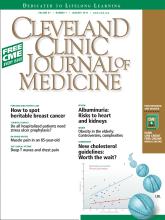Index by author
Aljaroudi, Wael
- You have accessDeep T waves and chest painM. Chadi Alraies, MD, Wael Aljaroudi, MD, Usman Ayub Khan, MBBS and Abdul Hamid Alraiyes, MDCleveland Clinic Journal of Medicine January 2014, 81 (1) 21-22; DOI: https://doi.org/10.3949/ccjm.81a.12176
After 3 hours of chest pain, a 67-year-old man presented with deep symmetric T-wave inversions in the precordial leads, a prognostically significant finding.
Alraies, M. Chadi
- You have accessDo all hospitalized patients need stress ulcer prophylaxis?Naseem Eisa, MD, Fateh Bazerbachi, MD, Abdul Hamid Alraiyes, MD and M. Chadi Alraies, MDCleveland Clinic Journal of Medicine January 2014, 81 (1) 23-25; DOI: https://doi.org/10.3949/ccjm.81a.13070
No. Only critically ill patients who meet specific criteria should receive it.
- You have accessDeep T waves and chest painM. Chadi Alraies, MD, Wael Aljaroudi, MD, Usman Ayub Khan, MBBS and Abdul Hamid Alraiyes, MDCleveland Clinic Journal of Medicine January 2014, 81 (1) 21-22; DOI: https://doi.org/10.3949/ccjm.81a.12176
After 3 hours of chest pain, a 67-year-old man presented with deep symmetric T-wave inversions in the precordial leads, a prognostically significant finding.
Alraiyes, Abdul Hamid
- You have accessDo all hospitalized patients need stress ulcer prophylaxis?Naseem Eisa, MD, Fateh Bazerbachi, MD, Abdul Hamid Alraiyes, MD and M. Chadi Alraies, MDCleveland Clinic Journal of Medicine January 2014, 81 (1) 23-25; DOI: https://doi.org/10.3949/ccjm.81a.13070
No. Only critically ill patients who meet specific criteria should receive it.
- You have accessDeep T waves and chest painM. Chadi Alraies, MD, Wael Aljaroudi, MD, Usman Ayub Khan, MBBS and Abdul Hamid Alraiyes, MDCleveland Clinic Journal of Medicine January 2014, 81 (1) 21-22; DOI: https://doi.org/10.3949/ccjm.81a.12176
After 3 hours of chest pain, a 67-year-old man presented with deep symmetric T-wave inversions in the precordial leads, a prognostically significant finding.
Bazerbachi, Fateh
- You have accessDo all hospitalized patients need stress ulcer prophylaxis?Naseem Eisa, MD, Fateh Bazerbachi, MD, Abdul Hamid Alraiyes, MD and M. Chadi Alraies, MDCleveland Clinic Journal of Medicine January 2014, 81 (1) 23-25; DOI: https://doi.org/10.3949/ccjm.81a.13070
No. Only critically ill patients who meet specific criteria should receive it.
Cetin, Derrick C.
- You have accessObesity in the elderly: More complicated than you thinkDerrick C. Cetin, DO and Gaelle Nasr, BACleveland Clinic Journal of Medicine January 2014, 81 (1) 51-61; DOI: https://doi.org/10.3949/ccjm.81a.12165
The number of obese older adults is on the rise, although we lack a proper definition of obesity in this age group. The ambiguity is primarily related to sarcopenia, the progressive loss of muscle and gain in fat that come with aging. Whether to treat and how to treat obesity in the elderly is controversial because of a paucity of established guidelines, but also because of the obesity paradox—ie, the apparently protective effect of obesity in this age group.
Cho, Leslie
- You have accessNew cholesterol guidelines: Worth the wait?Chad Raymond, DO, Leslie Cho, MD, Michael Rocco, MD and Stanley L. Hazen, MD, PhDCleveland Clinic Journal of Medicine January 2014, 81 (1) 11-19; DOI: https://doi.org/10.3949/ccjm.81a.13161
An appraisal of the controversial new guidelines, with case scenarios illustrating their advantages and shortcomings.
Eisa, Naseem
- You have accessDo all hospitalized patients need stress ulcer prophylaxis?Naseem Eisa, MD, Fateh Bazerbachi, MD, Abdul Hamid Alraiyes, MD and M. Chadi Alraies, MDCleveland Clinic Journal of Medicine January 2014, 81 (1) 23-25; DOI: https://doi.org/10.3949/ccjm.81a.13070
No. Only critically ill patients who meet specific criteria should receive it.
Eng, Charis
- You have accessHow to spot heritable breast cancer: A primary care physician’s guideMarissa Smith, MS, CGC, Jessica Mester, MS, CGC and Charis Eng, MD, PhDCleveland Clinic Journal of Medicine January 2014, 81 (1) 31-40; DOI: https://doi.org/10.3949/ccjm.81a.13051
Because breast cancer is common, primary care physicians will encounter many patients who have a personal or family history of it. Many patients may benefit from referral to a cancer genetics program for assessment, genetic counseling, and consideration of genetic testing. This article discusses the complexities of risk assessment in cancer genetics (focusing on breast cancer), and highlights the primary care physician’s role in identifying and caring for patients at risk.
Hazen, Stanley L.
- You have accessNew cholesterol guidelines: Worth the wait?Chad Raymond, DO, Leslie Cho, MD, Michael Rocco, MD and Stanley L. Hazen, MD, PhDCleveland Clinic Journal of Medicine January 2014, 81 (1) 11-19; DOI: https://doi.org/10.3949/ccjm.81a.13161
An appraisal of the controversial new guidelines, with case scenarios illustrating their advantages and shortcomings.
Jolly, Stacey E.
- You have accessAlbuminuria: When urine predicts kidney and cardiovascular diseaseReejis Stephen, MD, SM, Stacey E. Jolly, MD, MAS, Joseph V. Nally, MD and Sankar D. Navaneethan, MD, MPHCleveland Clinic Journal of Medicine January 2014, 81 (1) 41-50; DOI: https://doi.org/10.3949/ccjm.81a.13040
Albuminuria is common. Traditionally considered a precursor to diabetic nephropathy, it has now been directly linked to adverse cardiovascular outcomes and death, independent of other risk factors. In this review, we compare the measures of albuminuria, examine the evidence linking it to renal failure, cardiovascular disease, and death, and provide recommendations for its testing and management.




